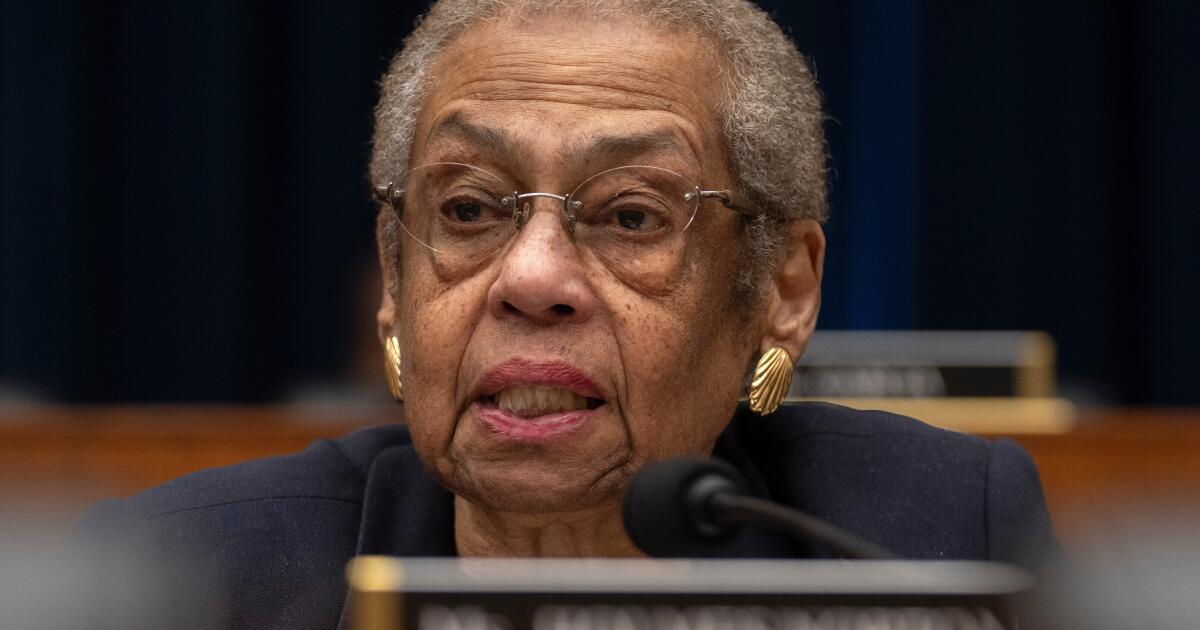Longtime D.C. Delegate Eleanor Holmes Norton is ending her reelection campaign for Congress
WASHINGTON — Eleanor Holmes Norton, the 18-term delegate for the District of Columbia in Congress and a veteran of the Civil Rights Movement, has filed paperwork to end her campaign for reelection, likely closing out a decades-long career in public service.
Norton, 88, has been the sole representative of the residents of the nation’s capital in Congress since 1991, but she faced increasing questions about her effectiveness after the Trump administration began its sweeping intervention into the city last year.
Mayor Muriel Bowser congratulated Norton on her retirement.
“For 35 years, Congresswoman Norton has been our Warrior on the Hill,” Bowser wrote on social media. “Her work embodies the unwavering resolve of a city that refuses to yield in its fight for equal representation.”
Norton’s campaign filed a termination report with the Federal Election Commission on Sunday. Her office has not released an official statement about the delegate’s intentions.
The filing was first reported by NOTUS.
Her retirement opens up a likely competitive primary to succeed her in an overwhelmingly Democratic city. Several local lawmakers had already announced their intentions to run in the Democratic primary.
An institution in Washington politics for decades, Norton is the oldest member in the House. She was a personal friend to civil rights icons such as Medgar Evers and a contemporary of other activists turned congressional stalwarts, including Rep. Jim Clyburn (D-S.C.) and the late Reps. John Conyers (D-Mich.) and John Lewis (D-Ga.).
But Norton has faced calls to step aside in recent months as residents and local lawmakers questioned her ability to effectively advocate for the city in Congress amid the Republican administration’s aggressive moves toward the city.
The White House federalized Washington’s police force, deployed National Guard troops from six states and the federal district across the capital’s streets and surged federal agents from the Department of Homeland Security into neighborhoods. The moves prompted outcry and protests from residents and a lawsuit from the district’s attorney general.
Norton’s retirement comes as a historically high number of lawmakers announce they will either seek another public office or retire from official duties altogether. More than 1 in 10 members of the House are not seeking reelection this year.
Norton’s staunch advocacy for her city
As the district’s delegate, Norton does not have a formal vote in the House. But she has found other ways to advocate for the city’s interests. Called the “Warrior on the Hill” by her supporters, Norton was a staunch advocate for D.C. statehood and for the labor rights of the federal workers who called Washington and its surrounding region home.
She also secured bipartisan wins for district residents. Norton was the driving force behind the passage of a law that provides up to $10,000 per year for students who attend public colleges outside the district. It also provides up to $2,500 per year for students who attend select private historically Black colleges and universities across the country and nonprofit colleges in the D.C. metropolitan area.
In the 1990s, Norton played a key role in ending the city’s financial crisis by brokering a deal to transfer billions of dollars in unfunded pension liabilities to the federal government in exchange for changes to the district’s budget. She twice played a leading role in House passage of a D.C. statehood bill.
Steeped in the civil rights movement
Norton was born and raised in Washington, and her life spans the arc of the district’s trials and triumphs. She was educated at Dunbar High School as part of the school’s last segregated class.
“Growing up black in Washington gave a special advantage. This whole community of blacks was very race conscious, very civil rights conscious,” she said in her 2003 biography, “Fire in My Soul.”
She attended Antioch College in Ohio and in 1963 split her time between Yale Law School and Mississippi, where she worked as an organizer during the Freedom Summer of the Civil Rights Movement.
One day that summer, Evers picked her up at the airport. He was assassinated that night.
Norton also helped organize and attended the 1963 March on Washington.
In an interview with the Associated Press in 2023, Norton said the march was still “the single most extraordinary experience of my lifetime.”
She went on to become the first woman to lead the Equal Employment Opportunity Commission, which helps enforce anti-discrimination laws in the workplace. She ran for office when her predecessor retired to run for Washington mayor.
Brown writes for the Associated Press.
